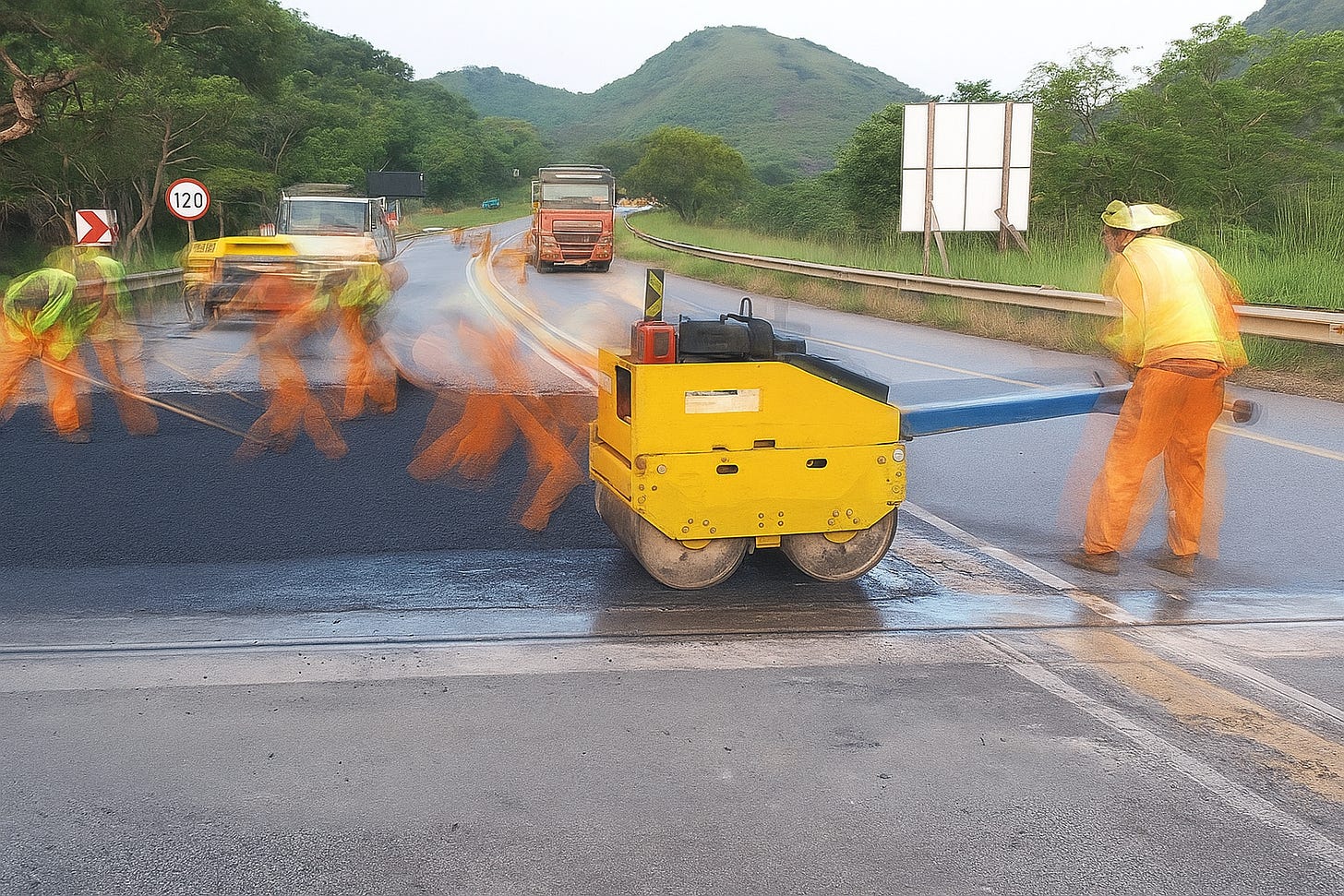Actually Clean Audits Do Point To Pro Poor Governance
South Africans should judge power by pipes built and not promises made
In September 2021 the Electoral Commission of South Africa approached the Constitutional Court, followed by a litany of parties (no less than eight parties intervening and four as amicus curiae) and argued for an order that it could postpone the local government election, then scheduled for 27 October 2021, to February 2022. This was still in the long shadow of Covid restrictions.
And on one of the few occasions during that Covid period our judiciary kept its heads and the justices declined to distort the electoral timetable. Maybe it helped that we were eighteen months into the pandemic by then, long past the days of disinfecting groceries and not being able to go to an open air beach.
The election was subsequently held on 1 November 2021. The next local government elections must therefore now be held five years, plus or minus three months, after the last one held. That puts the window between September 2026 and February 2027.
Hence the palpable sense that the election season has effectively kicked off with it likely happening with twelve months.
Election Season Has Started
Over the last three weeks, the commentariat and social media has busied itself with the DA’s favourite and arguably best boast: clean governance. Others concede this DA success through gritted teeth. But now, curiously, various pundits and chronic social media posters have adopted the position that clean audits don’t tell you much about good or inclusive governance.
This new angle sounds clever until you actually read the law. Clean audits do in fact point to good governance and pro-poor spending. The Auditor-General doesn’t only ask whether money was spent where the budget said it would be spent. She checks whether organs of state followed the rules on supply chain management, whether they kept within the legal rails on how public money must be allocated, and whether they met the requirements that exist precisely to protect the poor.
South African public finance law compels pro-poor spending. South African public finance law compels pro-poor spending. Section 153 of the Constitution requires every municipality to structure its budget and planning processes to “give priority to the basic needs of the community” and to promote social and economic development. The Municipal Systems Act in section 74 obliges councils to adopt tariff policies that ensure access to at least basic services for poor households through lifeline tariffs or subsidies. And the Division of Revenue Act, which governs how national funds flow to municipalities, explicitly earmarks the local government equitable share to finance free or basic services for indigent residents.
So when audit outcomes are clean, it is a strong signal that the legal obligations to serve the poor are being met. You can dislike the DA but pretending the audit regime is cosmetic is at best uninformed and at worse dishonest.
The fact that clean governance is good for all South Africans is evident in the recognition that bodies like the South African Property Owners Association give with its Municipal Performance Awards. The 2025 awards honoured four DA municipalities in the Western Cape in the Best-Performing Municipalities category, namely Saldanha Bay, Swartland (jointly first place), Swellendam, (second) and Hessequa (third) with the City of Cape Town being recognised as the best metropolitan municipality.
And the Auditor-General has pushed back against this new political slogan of treating clean audits as box-ticking. The AG Tsakani Maluleke has taken issue with president Ramaphosa’s ‘unhelpful posture’ on clean audits and said that they are fundamental to good governance. The knowlegde outside of party politics and the opinion pages is unanimous that financials are fundamental to good governance. To argue otherwise is performative politics at its easiest, namely loud, cost-free, and allergic to facts.
It is quite bizarre how some hold the DA to impossible standards (as if clean audits are not good enough), and the ANC to none. But luckily citizens don’t live in thinkpieces. They live with pipes, cables and buses. If you want to test a government’s sincerity, look there.
Cape Town’s Pro Poor Spending
Here is what pro-poor spending by a DA government looks like in Cape Town.
Over the next three years the City will spend a record R40 billion on infrastructure. Three quarters of that is directed to lower-income households. Unlike all of the ANC’s plans these aren’t grand promises on paper but appropriated money moving through tenders, purchase orders and site instructions right now.
About forty percent of the capital plan is water and sanitation. The City is replacing 100 kilometres of sewer and 50 kilometres of water mains every year, across the metro. There’s a completed R4 billion upgrade at Zandvliet, servicing Khayelitsha and beyond. The Cape Flats bulk sewer upgrade, the largest of its kind in South Africa, is advancing and will benefit more than 300 000 households. None of this fits the narrative the transformationist commentary class prefers, which treats actual work as distractions from “real” change. This type of infrastructure is typically why people move to Cape Town to escape the ANC dysfunction elsewhere.
Turning to transport. the single biggest public transport project by any city in the country is underway in Cape Town. The MyCiTi link from Khayelitsha and Mitchells Plain to Wynberg and Claremont. It’s multi-year, multi-billion rand, and aimed at cutting the brutal time tax that apartheid planning still extracts from the poorest workers. It will sit alongside the N2 Express and add to the existing MyCiTi network from Atlantis into the inner city. Alongside this, the City is investing several billion in roads, resurfacing, congestion relief and the basic repairs commuters actually feel, like a pothole that is fixed before it becomes a crater like those seen in Johannesburg.
Then there’s safety, one of the top concerns of Capetonians. Since 2021, the number of operational SAPS officers has declined by approximately 15%, from an estimated 8 668 officers to only 7 355 in 2025. This is a reduction of more than 1 300 SAPS officers. Over the same period, the City’s own enforcement capacity has expanded significantly to compensate. The Law Enforcement Advancement Plan (LEAP) has grown by 121%, and the Metro Police Service by 93%.
Hundreds of new municipal police officers are going onto the streets. Neighbourhood policing teams are being built in every ward. A growing technology stack is helping responders move faster and with better information. And the City keeps pushing for the devolution of key investigative powers so that local officers can build prosecution-ready dockets on gang, gun and drug crimes.
On housing, the hardest test of all, the City has released more well-located land in the last two years than in the decade before. The pipeline for affordable and social housing near the CBD and other economic nodes stands at roughly 12 000 units. The work is real, the pipeline is visible, and it’s accelerating rather than shrinking (as is the case where the ANC governs).
Conclusion
If you want to find fault in Cape Town you can. Any honest government will admit where it fails and the DA does. Governing is messy but that’s not an excuse where the DA governs. But the purity tests that thrive on social media and the writings of the intelligentsia is of little actual value for the lived experience of South Africans.
And most importantly, the consequences of failed audits is certain: a city with dirty books will not serve the poor. Corruption and chaos are regressive taxes. They fall heaviest on those with the least margin for error. That’s why audit outcomes matter.
So the argument that clean audits don’t translate to pro-poor programmes is an unserious way to discuss the problems South Africa faces. It is unhelpful to judge the ANC on its promises but never its performance while judging the DA against made up standards. In practice both should be judged on results that ordinary people can see and touch.
More articles:
If you found this piece worthwhile, feel free to share it with someone who might appreciate it.
To get future essays delivered directly to your inbox, you can subscribe here:
I welcome thoughtful conversation—feel free to reach out on LinkedIn or follow along on Twitter.
An edited version of this article was published on BusinessDay. If you'd like to support my writing please subscribe and consider a pledge.
This cover image was created using Sora.






